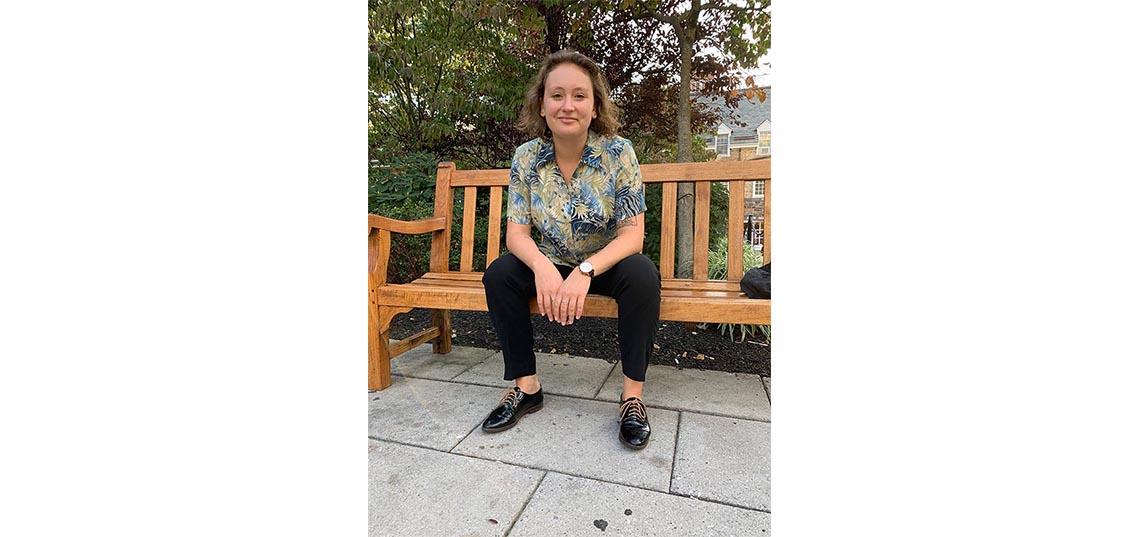
The Association for Information Science and Technology (ASIS&T) Special Interest Group for Social Informatics (SIG SI), has named SC&I Ph.D. candidate Diana Floegel a recipient of its inaugural Emerging Social Informatics Researcher Award. The award recognizes Floegel’s work as an emerging researcher in social informatics.
"I am extremely grateful to have my work recognized by ASIS&T's Social Informatics Special Interest Group. I look forward to continuing to develop my theoretical contributions and research agenda," Floegel said.
Floegel will receive the award at the ASIS&T 2020 conference, "Information for a Sustainable World: Addressing Society's Grand Challenges,” which will be held virtually in October 2020.
At the conference they will also present their paper co-authored with Assistant Professor Kaitlin Costello "Predictive Ads Are Not Doctors": Mental Health Tracking and Technology Companies.” Costello and Floegel wrote about the paper, “Although using mobile phone apps to track and monitor mental health is increasingly popular, we know little about how and why people with mental health diagnoses use such technologies, nor do we know of concerns they may express about these apps. Further, automated assessments of mental health status, or digital phenotyping, are also on the rise; how people with mental health conditions feel about such technologies is also an underexplored area of research.
“This paper presents an exploratory interview study with 12 people that begins to address these gaps. We focus specifically on how participants, who all have been diagnosed mental health conditions, perceive tech companies’ involvement with existing mental health apps and mental health digital phenotyping. We find that participants satisfice in order to interact with existing mood tracking apps, and that they are wary of digital phenotyping for mental health diagnostics. Participants raise concerns related to profit motives, distrust, and fatalism in both cases, and they recommend regulations that may be put in place to keep tech companies in check. Though participants describe regulatory policies that may mitigate their concerns, we question whether regulations can truly foster sustainable interactions with mental health apps operated by technology companies.”
Floegel will also present a second paper, “Values, Risks, and Power Influencing Librarians’ Decisions to Host Drag Queen Storytime,” co-authored with colleagues at the University of Kentuky and the University of South Carolina.
At the conference, which Floegel will be able to attend free of charge as an award winner, they will also have the opportunity to attend the Social Informatics Research Symposium, where they will be able to network with other researchers.
“Diana’s a well-deserving recipient of the 2020 Emerging Social Informatics Researcher award,” Costello said. “Their research in social informatics contributes significantly to our understanding of how online interactions are shaped by sociotechnical and biopolitical power dynamics. I believe they were chosen for this award because their research addresses some of the core concepts in social informatics research with a fresh, transdisciplinary perspective. An emerging researcher award also demonstrates promise for the future, and I look forward to seeing Diana’s work continue to evolve.”
Floegel’s research examines phenomena including people's information creation practices, sociotechnical assemblages, and social justice in information institutions such as libraries. They are broadly interested in expanding conceptions of sociotechnical systems that account for structural power dynamics. They primarily use constructivist grounded theory with qualitative methods to conduct their research.
At SC&I Floegel teaches the classes Gender and Technology, Reference Sources and Services, and Structures of Information, and they have held numerous research assistantships during their time as a student.
Floegel earned their bachelor’s degree from the College of William and Mary and their Master of Information at SC&I in 2016.
Learn more about the Ph.D. Program at the Rutgers School of Communication and Information on the website.
Photo: Courtesy of Diana Floegel
